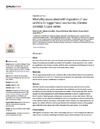Identificador persistente para citar o vincular este elemento:
https://accedacris.ulpgc.es/jspui/handle/10553/57428
| Título: | Mortality associated with ingestion of sea urchins in loggerhead sea turtles (Caretta caretta): A case series | Autores/as: | Inurria, Alicia Arencibia Espinosa, Alberto Calabuig Miranda,Pascual Gómez, May Déniz Suárez, María Soraya Orós, Jorge |
Coordinadores/as, Directores/as o Editores/as: | Ambrósio, Carlos E. | Clasificación UNESCO: | 2401 Biología animal (zoología) | Palabras clave: | Canary-Islands Echinodermata Conservation |
Fecha de publicación: | 2019 | Publicación seriada: | PLoS ONE | Resumen: | Aims: The aims of this study were: a) to describe the pathological and laboratory findings in a case series of stranding and mortality associated with ingestion of large amounts of sea urchins in loggerhead turtles (Caretta caretta), and b) to alert veterinarians and biologists involved in sea turtle conservation of this cause of stranding and/or death. Methods: The six loggerheads studied were stranded on the coasts of Gran Canaria, Canary Islands, Spain, between 2008 and 2015. Post mortem studies included pathological, microbiological, and sea urchin species identification procedures. Results: All turtles showed severe intestinal impaction caused by large amounts of sea urchins, mainly affecting the colon and the caudal half of the small intestine. Histologically, severe focal fibrinonecrotic enteritis was diagnosed in two turtles. In the remaining turtles, lesions ranged from mild desquamation of the intestinal epithelium to severe congestion of the blood vessels of lamina propria, submucosa, muscular and serosa, and edema. Vibrio sp. was isolated from the spleen and intestinal mucosa of a loggerhead in which focal fibrinonecrotic enteritis had been diagnosed. In five turtles, all the remains were fragments from longspined sea urchins (Diadema africanum); the last turtle contained a mixture of long-spined sea urchin (90%) and purple sea urchin (Sphaerechinus granularis) (10%) remains. Conclusions: Although the prevalence of this cause of stranding was low (< 1.6%) compared to other mortality causes, continued overfishing and anthropogenic climate change could increase its incidence. Intestinal impaction with large amounts of sea urchins should be included in the differential diagnosis of gastrointestinal diseases in sea turtles, and the possible toxic effect of some sea urchin species on sea turtles should also be investigated. | URI: | https://accedacris.ulpgc.es/handle/10553/57428 | ISSN: | 1932-6203 | DOI: | 10.1371/journal.pone.0221730 | Fuente: | PLoS ONE [ISSN 1932-6203],v. 14 (8), e0221730 |
| Colección: | Artículos |
Citas SCOPUSTM
1
actualizado el 08-jun-2025
Citas de WEB OF SCIENCETM
Citations
2
actualizado el 22-feb-2026
Visitas 10
384
actualizado el 15-ene-2026
Descargas
237
actualizado el 15-ene-2026
Google ScholarTM
Verifica
Altmetric
Comparte
Exporta metadatos
Los elementos en ULPGC accedaCRIS están protegidos por derechos de autor con todos los derechos reservados, a menos que se indique lo contrario.
